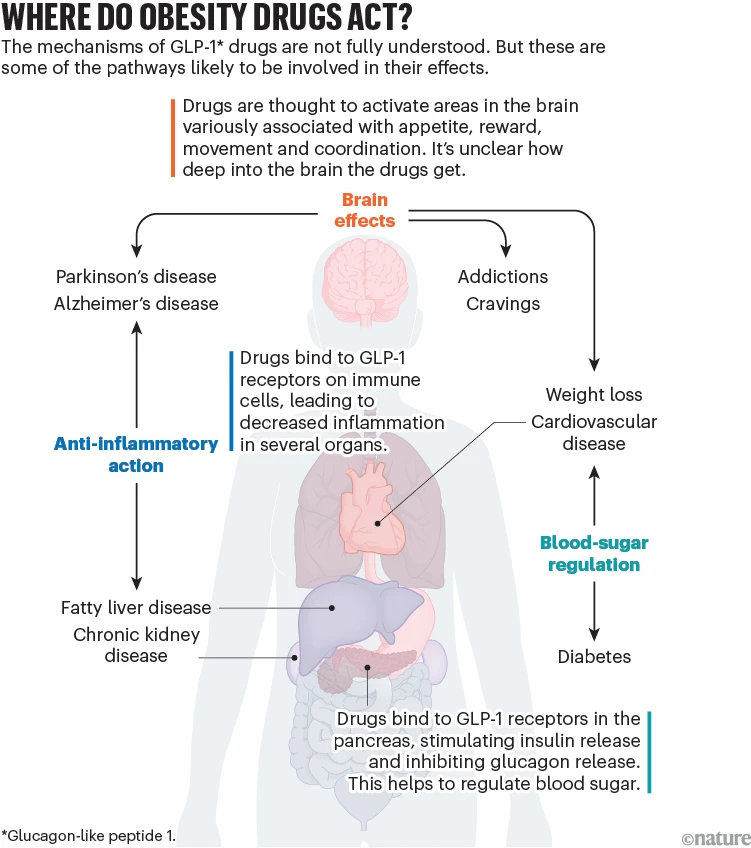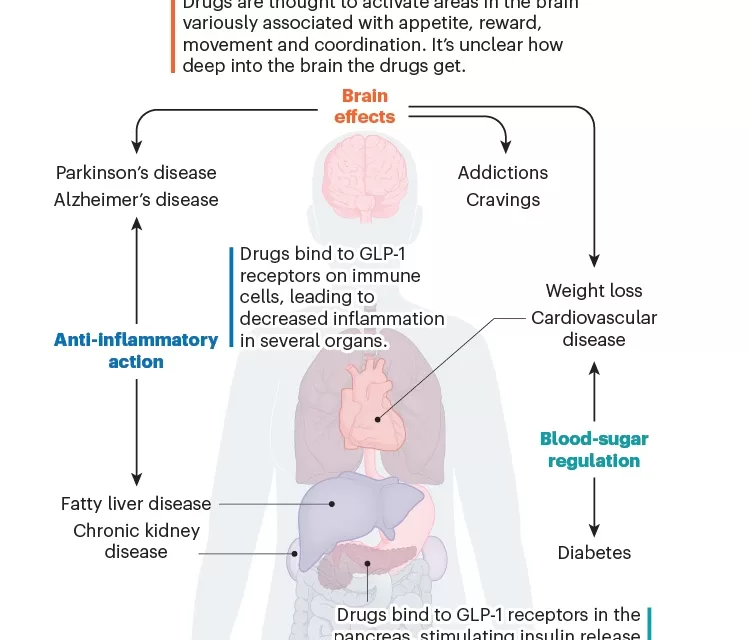Baltimore, Maryland — In a unique bar-like research laboratory at the National Institutes of Health (NIH), scientists are investigating the surprising potential of anti-obesity drugs to combat various addictions, including alcohol and tobacco. This research focuses on glucagon-like peptide 1 (GLP-1) receptor agonists, a new class of weight-loss medications that could address multiple health issues beyond obesity.
As scientists explore the effects of these drugs, early evidence suggests they may help reduce cravings for alcohol and other addictive substances. Lorenzo Leggio, an addiction researcher leading this groundbreaking trial, has created an environment where volunteers can engage with their favorite alcoholic beverages while undergoing assessments related to their cravings. Some participants will receive semaglutide (marketed as Wegovy), while others will receive a placebo, allowing researchers to gauge the drug’s impact on addiction.
Emerging studies indicate that GLP-1 drugs could yield various health benefits, including reducing the risk of heart attacks, strokes, and death in patients with cardiovascular disease, alleviating symptoms of sleep apnea, and potentially slowing the progression of neurodegenerative diseases like Parkinson’s and Alzheimer’s. With hundreds of clinical trials underway, researchers are keen to discover the full extent of these medications’ therapeutic applications.

Unraveling Mechanisms and Impacts
The transformative potential of GLP-1 drugs lies in their ability to mimic natural GLP-1 hormones in the body, acting on both gut and brain receptors. Unlike the body’s naturally occurring GLP-1, which is metabolized rapidly, synthetic GLP-1 drugs remain effective for longer periods, allowing them to interact with various brain regions involved in appetite control, mood regulation, and reward pathways.
“Understanding how these drugs function will not only clarify their therapeutic benefits but also address potential side effects such as nausea and constipation,” says Dr. Daniel Drucker, an endocrinologist at the University of Toronto.
Research indicates that these drugs suppress not only appetite but also addictive behaviors by dampening the brain’s reward system. This could explain why individuals on GLP-1 medications might find themselves less inclined to engage in habitual behaviors like drinking or smoking, without diminishing their overall ability to experience pleasure.
Broadening Applications
The therapeutic promise of GLP-1 medications extends beyond weight management. Weight loss, a direct benefit of these drugs, plays a crucial role in conditions such as obstructive sleep apnea and polycystic ovary syndrome (PCOS). Additionally, recent trials have demonstrated that GLP-1 drugs can reduce severe kidney complications in diabetic patients, suggesting anti-inflammatory properties that warrant further exploration.
Preliminary research also points to GLP-1’s potential in treating neurodegenerative diseases. Clinical trials involving drugs like exenatide and liraglutide show promise in improving symptoms of Parkinson’s and potentially slowing cognitive decline in Alzheimer’s patients.
Dr. Christian Hölscher, a neuroscientist investigating these treatments, emphasizes the need for further studies to understand how GLP-1 drugs can penetrate the brain and exert neuroprotective effects.
The Future of GLP-1 Drugs
As the research progresses, experts caution that it may take years to confirm the efficacy of GLP-1 drugs for conditions beyond obesity. However, the ongoing trials and studies highlight a shift in how these medications are perceived — not merely as weight-loss solutions but as multifaceted treatments that could revolutionize approaches to addiction and chronic diseases.
“The landscape of medicine is changing with these discoveries,” says Randy Seeley, an obesity specialist at the University of Michigan. “We are entering an era where GLP-1-based therapies might be considered for a vast array of conditions.”
With an expanding repertoire of potential uses, the investigation into GLP-1 drugs promises to provide new avenues for treating various health challenges, transforming the lives of many who battle obesity, addiction, and chronic diseases. As scientists continue to unravel the mysteries of these medications, the future looks promising for a broader understanding of their benefits in modern medicine.
Diseases that obesity drugs might treat
| Condition | Drug | Result | Study and trial stage |
|---|---|---|---|
| Sleep apnoea | Tirzepatide | Reduced severity in obese adults with the condition | SURMOUNT-OSA trial, phase III |
| Atherosclerosis (from heart disease) | Tirzepatide | Reduced risk of disease (in overweight adults) | SURMOUNT-1 trial, phase III |
| Serious cardiovascular outcomes | Semaglutide | Reduced risk of death and other serious cardiovascular outcomes | SELECT trial, phase III |
| Chronic kidney disease | Semaglutide | Reduced risk of serious kidney outcomes and death from cardiovascular causes | FLOW trial, phase III |
| Parkinson’s disease | Exenatide | Improved motor abilities | Phase II |
| Alzheimer’s disease | Liraglutide | Slowed cognitive decline | Phase IIb (unpublished results) |
| Polycystic ovary syndrome (PCOS) | Semaglutide | Improved reproductive measurements (testosterone levels and number of periods) | TEAL trial, phase II/III (unpublished results) |
| Fatty liver disease (metabolic dysfunction-associated steatohepatitis) | Survodutide | Improved symptoms; lowered liver fat content | Phase II |
| Male infertility | Liraglutide | Improved sperm parameters (in men with functional hypogonadism) | Clinical trial |
| Opioid use disorder | Liraglutide | Reduced opioid cravings | Phase I/II trial (unpublished results) |
| Smoking | Exenatide | Improved smoking abstinence | Phase I/II |
| Suicidal ideation | Semaglutide | Reduced risk of suicidal ideation | Retrospective study of electronic health records |
| Tobacco use disorder | Semaglutide | Reduced risk of tobacco use disorder | Retrospective study of electronic health records |
| Cannabis use disorder | Semaglutide | Reduced risk of cannabis use disorder | Retrospective study of electronic health records |
| Alcohol use disorder | Semaglutide | Reduced risk of alcohol use disorder | Retrospective study of electronic health records |
| Depression | Exenatide | Reduced depression-like behaviour | Preclinical study in rats |
| Female infertility | GLP-1 hormone and exenatide | Improved reproductive measurements | Preclinical study in rats |












